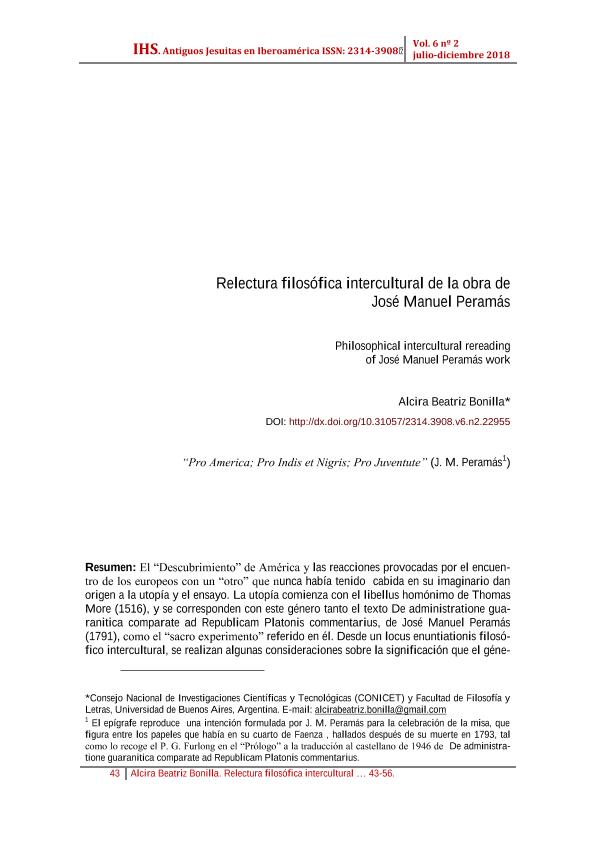Artículo
El “Descubrimiento” de América y las reacciones provocadas por el encuentro de los europeos con un “otro” que nunca había tenido cabida en su imaginario dan origen a la utopía y el ensayo. La utopía comienza con el libellus homónimo de Thomas More (1516), y se corresponden con este género tanto el texto De administratione guaranitica comparate ad Republicam Platonis commentarius, de José Manuel Peramás (1791), como el “sacro experimento” referido en él. Desde un locus enuntiationis filosófico intercultural, se realizan algunas consideraciones sobre la significación que el género utópico tuvo en y para América, y una relectura analítica, breve por fuerza, de la obra mencionada, con el objeto de mostrar los límites de la interculturalidad realizada bajo condiciones asimétricas. The “Discovery” of America and the reactions of the Europeans due to the encounter with a never before imagined cultural “Other” gave rise to new philosophical genres: the utopia and the essay. The utopia begins with Thomas More’s homonymous libellus (1516). Utopical are also Peramás’ De administratione guaranitica comparate ad Republicam Platonis commentarius (1791), as well as the political “sacred experiment” narrated in this text -the Guaraní Missions-. On the basis of an intercultural philosophical locus enuntiationis, the autor of this article outlines some considerations on the diverse significance the utopical genre has had in America, and she provides an analytical rereading of this work, with the aim to show the limits of intercultural relationships carried out under asymmetrical conditions.
Relectura filosófica intercultural de la obra de José Manuel Peramás
Título:
Philosophical intercultural rereading of José Manuel Peramás work
Fecha de publicación:
12/2018
Editorial:
Centro de Investigaciones y Estudios sobre Cultura y Sociedad
Revista:
Antiguos Jesuitas en Iberoamérica
ISSN:
2314-3908
Idioma:
Español
Tipo de recurso:
Artículo publicado
Clasificación temática:
Resumen
Archivos asociados
Licencia
Identificadores
Colecciones
Articulos(SEDE CENTRAL)
Articulos de SEDE CENTRAL
Articulos de SEDE CENTRAL
Citación
Bonilla, Alcira Beatriz; Relectura filosófica intercultural de la obra de José Manuel Peramás; Centro de Investigaciones y Estudios sobre Cultura y Sociedad; Antiguos Jesuitas en Iberoamérica; 6; 2; 12-2018; 43-56
Compartir
Altmétricas




